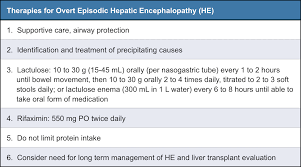The nurse is caring for a client who has ascites and hepatic encephalopathy. Which of the following prescriptions should the nurse clarify with the primary healthcare provider (PHCP)?
Rifaximin
Lactulose
Spironolactone
Alprazolam
The Correct Answer is D
Choice A rationale: Used in the management of hepatic encephalopathy by reducing the production of ammonia in the gut.
Choice B rationale: Often prescribed to reduce ammonia levels in hepatic encephalopathy by promoting bowel movements and aiding ammonia excretion. Choice C rationale: Typically used in managing ascites by reducing fluid retention and treating edema.
Choice D rationale: This medication can potentially worsen hepatic encephalopathy due to its sedative effects and impact on mental function. It's crucial to clarify its use in a patient with hepatic encephalopathy.

Nursing Test Bank
Naxlex Comprehensive Predictor Exams
Related Questions
Correct Answer is A
Explanation
Choice A rationale: While it can be used for muscle spasms associated with musculoskeletal conditions, it's not primarily used as a first-line treatment for osteoarthritis pain and inflammation.
Choice B rationale: Ibuprofen is a nonsteroidal anti-inflammatory drug (NSAID) commonly used to relieve pain and inflammation associated with osteoarthritis.
Choice C rationale: It's a medication used for chronic pain conditions, including OA- related pain.
Choice D rationale: Often used for mild to moderate OA pain relief, it's a common medication for OA management.
Correct Answer is A
Explanation
Choice A rationale: Yeast vaginitis, commonly known as a yeast infection, is typically caused by an overgrowth of Candida albicans, a type of fungus. Candida albicans overgrowth can lead to symptoms like white, thick discharge and itching in the vaginal area.
Choice B rationale: Lactobacillus acidophilus is a bacterium associated with maintaining vaginal health rather than causing yeast infections.
Choice C rationale: Escherichia coli is a bacteria that can cause different types of infections but are not typically associated with yeast vaginitis.
Choice D rationale: Neisseria gonorrhoeae is a bacteria and does not cause yeast vaginitis despite having similar presentation such as pus discharge per vaginally.
Whether you are a student looking to ace your exams or a practicing nurse seeking to enhance your expertise , our nursing education contents will empower you with the confidence and competence to make a difference in the lives of patients and become a respected leader in the healthcare field.
Visit Naxlex, invest in your future and unlock endless possibilities with our unparalleled nursing education contents today
Report Wrong Answer on the Current Question
Do you disagree with the answer? If yes, what is your expected answer? Explain.
Kindly be descriptive with the issue you are facing.
